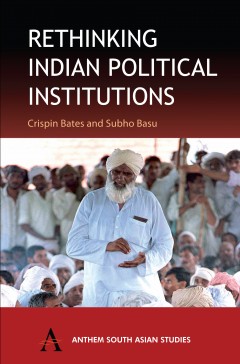Rethinking Indian Political Institutions
Edited by Crispin Bates & Subho Basu
Other Formats Available:
- About This Book
- Reviews
- Author Information
- Series
- Table of Contents
- Links
- Podcasts
About This Book
Modern India is emerging as a global power within which the Indian state plays a critical role in delivering economic development and maintaining the integrity and unity of society. By drawing upon informed essays from scholars and researchers engaged in the field, this volume provides critical, empirical and conceptual insights into state-society relationships over issues as diverse as cable TV networks, urban planning, garbage collection, economic liberalization, coalition politics, provincial political rhetoric, individual rights and political participation and the management of village and municipal councils. In an era dominated by news of state failures in many Asian and African countries, the political institutions of the Indian state present an unusual combination of flexibility and stability. Within a democratic system, they enable the state to absorb and respond to popular pressures while winning public support for radical solutions to pressing social problems. Stretching from the centre down to the village, these institutions form a labyrinthine structure, occasionally harmonious but often the arena of intense economic, social and political conflict, the outcome of which will prove vital for India’s hopes of future growth and development. This book will be an invaluable reading for students across the disciplines of history, sociology, politics and government, as well as to development practitioners, policy makers, and readers keen to learn more about recent innovations in the theory and practice of governance in India.
Reviews
Author Information
Crispin Bates is Senior Lecturer in Modern South Asian History in the School of History & Classics at the University of Edinburgh and Director of Edinburgh University's Centre for South Asian studies.
Subho Basu is presently an Assistant Professor at Syracuse University, where he teaches Indian History in general and nationalist politics in the late nineteenth and early twentieth century in particular.
Series
Anthem South Asian Studies
Table of Contents
Contributors; Introduction; Politics at the Central Level: 1. The Politics of Ecnomic Reforms in India: A Review of the Literature; 2. The Temptations of Presidentialism: An Explanation of the Evolving Political Strategy of the BJP; Politics at Provincial Level: 3. Ideological Integration in Post-Colonial (South) India: Aspects of a Political Language; 4. The Fight for Turf and the Crisis of Ideology: Broadcasting Reform and Media Distribution Networks in India; Politics at Urban & Town Level: 5. Land Use in Bombay: Institutional Effects and Political Outcomes; 6. Understanding Local Politics, Democracy and Civil Society: Environmental Governance in Urban India; 7. Political Institutions, Strategies of Governance and Forms of Resistance in Rural Market Towns of Contemporary Bengal: A Study of Bolpur Municipality; Rural Politics: 8. Autonomy, Political Literacy and the 'Social Woman': Towards a Politics of Inlcusion; 9. The Development of Panchayati Raj; 10. Political Representation and Women's Empowerment: Women in the Institution of Local Self- Government in Orissa; Notes; Bibliography; Glossary; Index
Links
Stay Updated
Information
Latest Tweets



